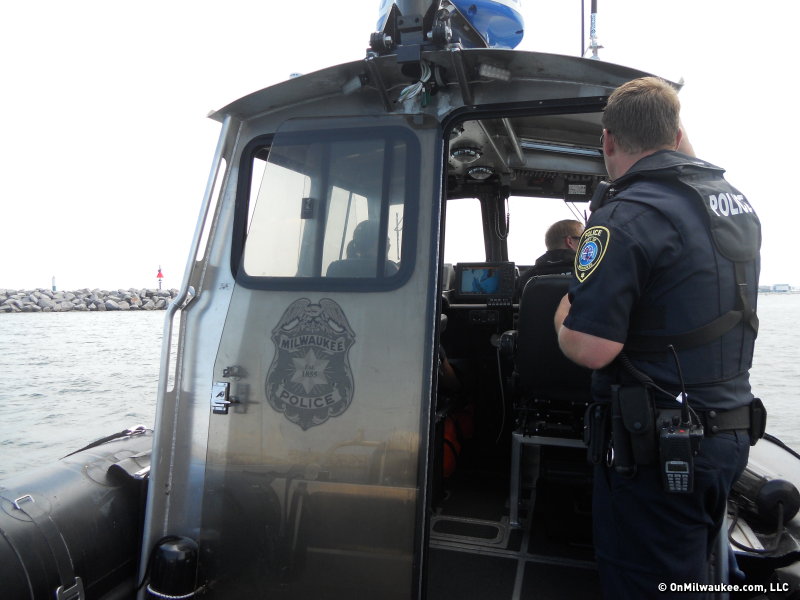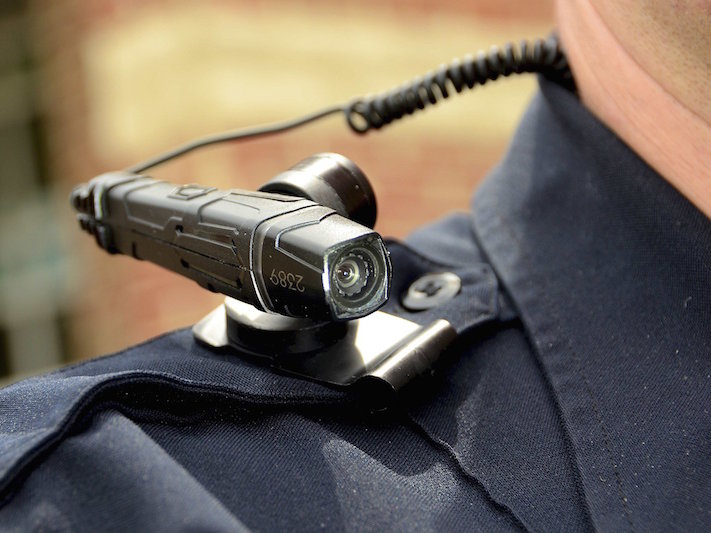Summer in Milwaukee means soaking up as much fun and sun as possible before the cold weather returns.
Luckily for us, there's plenty of beach and patio space to do it from – and for the especially lucky, summer means pulling the boat out of storage and setting sail.
Not everyone on the water has their sea legs, though, and that's where the Harbor Patrol comes in. The men and women of this special division of the Milwaukee Police Department are tasked with keeping an eye out for the safety of everyone on the water, and recently I had the opportunity to ride along and witness, first-hand, how they operate.
"Milwaukee, most people don't know, is one of the busiest recreational ports on the Great Lakes," said Officer Christopher Boss, who, along with Officers Wyatt Graikowski and Nicole Gengler, took me out on patrol for the afternoon. "The recreational boating crowd is pretty dedicated here; we have a lot of people from out of state."
The harbor patrol officers are on the water for approximately six months from April to October, and are also on call during the winter months for distress calls and search and rescue. They, along with the Department of Natural Resources and Coast Guard, help safeguard Milwaukee County's lakefront and rivers.
"We are dependent upon the Coast Guard as much as they are dependent upon us," said Boss. "They have certain restrictions; we can work beyond those restrictions. We team up with them on a daily basis for training, for operations, for special events, for Summerfest."
The average number of occurrences the Harbor Patrol deals with depends on the day, the weather and a variety of other factors, but the peak summer season obviously keeps them the busiest.
"It gets very busy out here," said Boss. "People come to enjoy the water; at the same time they want to enjoy the festival season. With Lakeshore State Park as well, there's places for people to actually stay the night easily adjacent to the Summerfest grounds, so we spend more time within that area."
What the patrol does, however, is far from television-inspired boat chases (even though the police boats can top out at 50 miles per hour). Rather, much of what the Harbor Patrol does is based around boater safety.
"It relates a lot to rules of the road. There's 'rules of the road' out here that unfortunately people are less familiar with than they would be on the road," explained Boss. "Unfortunately, there is very little in the way of getting a license like getting a car. The best the state has been able to do is requiring a boater's safety certificate for power boating if you were born on or after a certain date in 1989.
"People don't have the training that I would deem necessary to come out on to especially a lake like Lake Michigan, where things can change quickly. The water right now outside of the wall is only 58 degrees. If you're doing something you shouldn't be doing and somebody goes over the side, the person in the water has a minute to control their breathing, they have five minutes of actual useful motion with their arms and legs, and then they're dead inside of an hour."
Consequently, most of what Boss and his fellow patrol officers deal with is safety checks and violations to make sure people are as prepared as they can be on the water.
"Obviously we have to have probable cause to stop a boat, a reason to stop them, like if their registration isn't valid, or if they're doing something stupid going through the gap," said Graikowski. "We stop the boat and we do a safety check, make sure everything is in order: their PFDs (personal floatation devices), a throw-able if you're over 16 feet, the right amount of fire extinguishers and other things like that."
Unlike the requirements for recreational boaters, the officers of the Harbor Patrol are fully prepared to handle everything from basic checks to extreme search and rescue.
"We get the basic training here, but back in the day it wasn't like that. You went out and the old guys show you how to do things," said Graikowski.
"Sgt. (Daniel) Bell, he's a really progressive sergeant. I just got done with some very difficult training – this water safety and survival instructor course, which was just great. There's also other classes that we have to go through to get certified through NASBLA (National Association of State Boating Law Administrators), which is a national level of certification that's on par with Coast Guard training."
Preventative measures like safety checks go a long way to avoid more serious trouble that requires the patrol officers use their advanced skills. During our three hours out, Boss, Graikowski and Gengler did plenty of surveillance. We made two official stops for improper registration display and issued one citation to a family who didn't have a child-sized PFD for their daughter. They seemed a little miffed, but Boss had plenty of examples to emphasize how important being on the offensive is for boaters.
"We run through, on average, probably 150 to 200 search and rescue cases each year, if not more. Anything from 'My boat broke down' to 'I'm sinking' to 'Somebody fell over the side,'" he said.
"(For) people who don't know the change in the weather it can be very dangerous. High waves, people up on the rocks, people hitting the break wall, ejecting over the break wall – that was last year. A gentleman hit 50 on his way out the gap – he hit the gap by chance – and he spun around to come back in and he hit the wall head-on and actually flipped the boat over the wall. He had four passengers that were ejected. They did manage to make it back to the wall where the Coast Guard and we responded to actually retrieve them, but unfortunately the operator didn't make it."
While the search and rescue part of the job does deal with serious consequences, thankfully they don't occur often. The officers attested that the vast majority of their jobs entail casual registration and safety checks like the ones we made on my ride-along.
Now that nicer weather has taken over, keeping an eye out for drunken boating is also on the agenda.
"Usually if somebody's going to be a problem it's because they've been drinking – the same as on the street," said Boss. "Same levels as apply to the road apply to the water: Above .08, you can't operate. The difference is, you can drink while driving a boat, but you have to stay beneath .08. If anything's going to go wrong on the water, more than likely it involves alcohol."
Major issues aside, the waters are usually peaceful for the Harbor Patrol. Although all three officers were constantly on alert, most of our time on the water was spent waving at fellow sailors and sharing information about the weather and wind shifts. Even the people we stopped were friendly. They're not always, I'm told, but it's a rare encounter.
"They can be a problem at times, but for the most part we're dealing with people that are out here having a good time," said Boss. "We are very, very grateful for what we're able to do. We do get to help people a lot out here."
Contrary to her natural state of being, Renee Lorenz is a total optimist when it comes to Milwaukee. Since beginning her career with OnMilwaukee.com, her occasional forays into the awesomeness that is the Brew City have turned into an overwhelming desire to discover anything and everything that's new, fun or just ... "different."
Expect her random musings to cover both the new and "new-to-her" aspects of Miltown goings-on, in addition to periodically straying completely off-topic, which usually manifests itself in the form of an obscure movie reference.







